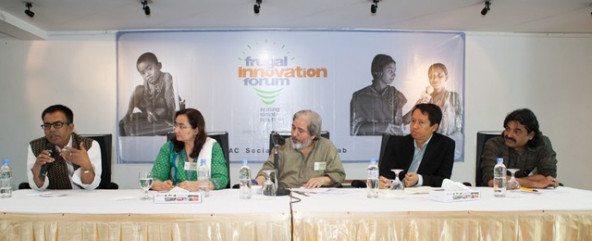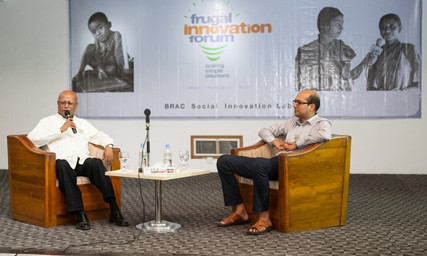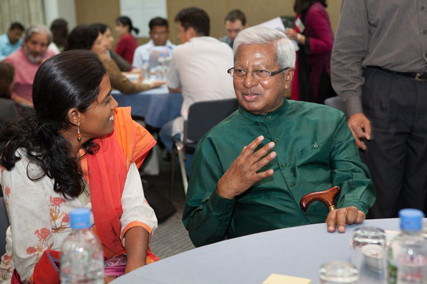 Panel on organizing communities. From left: Arbind Singh (Nidan), Shandana Khan (Rural Support Programmes Network), Syed Hashemi (BRAC Development Institute), Gum Sha Aung (Metta Myanmar), and Kishore Singh (Urban Partnership for Poverty Reduction).
Panel on organizing communities. From left: Arbind Singh (Nidan), Shandana Khan (Rural Support Programmes Network), Syed Hashemi (BRAC Development Institute), Gum Sha Aung (Metta Myanmar), and Kishore Singh (Urban Partnership for Poverty Reduction).
Late last month, a group of South Asian leaders gathered in Dhaka for the first Frugal Innovation Forum: Scaling Simple Solutions. Nowhere is the importance of innovation more apparent than in quickly-changing contexts such as Bangladesh: Many villagers are migrating to cities and abroad; women are increasingly entering the workforce; there is a youth bulge; and with increases in life expectancy, the fastest growing demographic is senior citizens. Given the complexity and interrelatedness of these challenges, tackling them requires more than just new strategies; it requires new paradigms of understanding, holistic thinking, and above all, flexible models that can evolve. The event was powerful, and laid out some important issues.
South Asians, perhaps due to the unique environmental factors of the region, seem to have an innate predisposition to what we might call the jugaad, or “frugal innovation,” mentality. This was one of the core beliefs that led us to organize the forum in the first place: A unique type of innovation was springing up across South Asia that would lend itself to further scale and adaption around the region. Jaideep Prabhu, co-author of Jugaad Innovation, spoke about the importance of this in his opening remarks at the forum. Perhaps another unique trait of South Asian innovation is that scale is such an assumed part of design. Where the rest of the world talks in the thousands or tens of thousands, South Asians speak of lakhs (hundreds of thousands) or crores (tens of millions). BRAC’s mantra, “small is beautiful, but big is a necessity” is nothing new to practitioners in Pakistan (population 176 million) and India (population 1.2 billion!). People in this region casually talk about magnitude of coverage and reach in a way that many countries’ presidents would—justifiably—have trouble fathoming.
 Mahabub Hossain (BRAC) and Jaideep Prabhu (Judge School of Business, University of Cambridge).
Mahabub Hossain (BRAC) and Jaideep Prabhu (Judge School of Business, University of Cambridge).
It’s easy to pay lip service to the need to learn from one other, but we don’t entirely understand actually how to do it. Rarely can we simply drop a ready-made model into a new place. Even the process of creation is hugely important in developing a sophisticated understanding—not just what works, but why it works. “Everyone needs to reinvent the wheel,” wrote Madhav Chavan, founder of Pratham, an incredible Indian organization transforming education nationally. “It’s important because all of us need our own kind of wheel.”
 Jothimani Sennimalai (Political activitist from India) and Sir Fazle Hasan Abed (BRAC).
Jothimani Sennimalai (Political activitist from India) and Sir Fazle Hasan Abed (BRAC).
We kicked off the event with three key questions: Do we need more social innovation, or is the big challenge these days just to scale up what we know? Is scale always a good thing? And, is frugal always the best way? We started by looking at these themes across these broad sectors: developing human capital, mobilizing communities, and fostering civic engagement. The growing divides within countries—urban to rural, connected to offline, young and old, arose as issues with which many are wrestling. There’s a huge need for platforms to connect people—either in old fashioned, U-shaped meetings, or on flashy websites such as I Paid a Bribe—but it’s crucial to find the hook. For vocational schools, that means successfully reading the market demand to essentially guarantee job placement to its students for groups of street vendors, it’s knowing to let go and let them lead, even if it means excluding “others,” such as waste pickers, and supporting them to create a society that represents their distinct needs. For many, technology is still a nice idea. However, despite the fast-growing numbers of cell phones, they are still out of reach for many, particularly rural women. Finding ways to build the urgently needed infrastructure and create pressure on the government is important, regardless of the ultimate goal. Shandana Khan of Pakistan’s Rural Support Programmes Network spoke about mobilizing communities to persuade the government to support community groups. Once the organization created the political commitment for resources, they were able to scale massively, from just 5 million members to more than 30 million. We see that the reshaping of the rules of the game has huge benefits and creates a strong foundation for growth.
Are you enjoying this article? Read more like this, plus SSIR's full archive of content, when you subscribe.
Arbind Singh of Nidan, who spoke at the Frugal Innovation Forum and was recognized as a Skoll Entrepreneur in 2012, is bringing some of our discussions to the Skoll World Forum this week. A few worth noting are:
Process innovations are often underappreciated but critical. The biggest and most successful organizations rarely owe their success to a product, but rather to their activities and capabilities.
“Big impact” mentality is a must. In his closing remarks, BRAC’s founder and chairperson Sir Fazle Abed told participants: “Many organizations are happy with results on a small scale. We need to be more ambitious.” There are plenty of challenges on the path to scale—don’t let your mindset be one of them!
To go fast (and burn out quickly), go alone. To go far, go with others, and forge a better path. The days of operating in a green field with no regulation or government engagement are gone. Increasingly, the challenge in development is building capacity for effective, independent action—of communities, of organizations, and of policy-markets. Nurturing inclusive ecosystems that embrace innovation and value development is the only way to sustainably tackle poverty.
Support SSIR’s coverage of cross-sector solutions to global challenges.
Help us further the reach of innovative ideas. Donate today.
Read more stories by Asif Saleh & Maria A. May.

